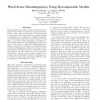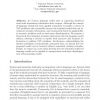49 search results - page 5 / 10 » An Empirical Study on Class-Based Word Sense Disambiguation |
ACL
1994
13 years 9 months ago
1994
Most probabilistic classi ers used for word-sense disambiguationhave either been based on onlyone contextual feature or have used a model that is simply assumed to characterize th...
TSD
2001
Springer
14 years 1 days ago
2001
Springer
Two kinds of systems have been defined during the long history of WSD: principled systems that define which knowledge types are useful for WSD, and robust systems that use the info...
CICLING
2008
Springer
13 years 9 months ago
2008
Springer
An N-gram language model aims at capturing statistical word order dependency information from corpora. Although the concept of language models has been applied extensively to handl...
FLAIRS
2011
2011
Impact of Word Sense Disambiguation on Ordering Dictionary Definitions in Vocabulary Learning Tutors
12 years 11 months ago
Past research has shown that dictionaries and glosses can be beneficial in computer assisted language learning, particularly in vocabulary learning. We propose that L2 vocabulary ...
COLING
1992
13 years 8 months ago
1992
This paper describes a program that disambignates English word senses in unrestricted text using statistical models of the major Roget's Thesaurus categories. Roget's ca...


